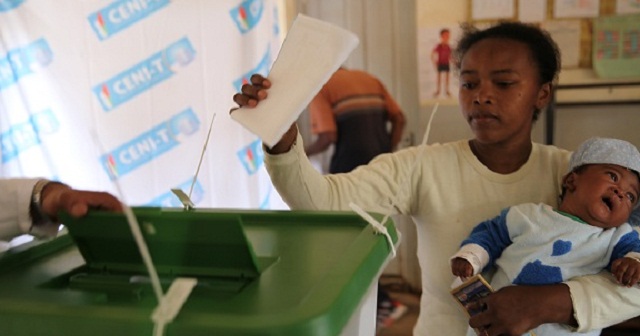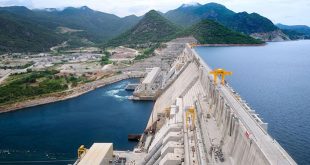
Amboasary, Madagascar | AFP | One after another, the mothers sat their babies in the shade, on a mat placed on the dusty ground. This morning at least, their children will have enough to eat.
In the village of Ifotaka, at the southern tip of Madagascar, the noise and excitement of the country’s election campaign seems far away as locals confront more pressing needs in a daily struggle for food.
For Pastrolina Vatofara, aid agency food distribution is a matter of survival.
“I earn a little money by harvesting sisal trees (to make rope) but that’s not enough to feed my three little ones,” said the 28-year-old mother. “With the drought, they would not survive without help… The government has forgotten us.”
But even on an empty stomach, Vatofara will vote Wednesday for the second round of the presidential election.
“I hope the next president will help us a little more,” she said.
For several seasons now, the entire southern part of Madagascar has been caught up in a drought that has made water increasingly scarce, wrecking even efforts to grow rice — the staple food.
“Today, 1.2 million people are food insecure,” said Maman Bashir Yacouba, head of the World Food Programme (WFP) in Madagascar.
“In most of these areas, the whole economy is based on agriculture and livestock, and it has been at least four years now that there has not been good rainfall — the situation has become worrying”.
Children are the worst hit, with almost half of those under five chronically malnourished. In areas affected by drought, up to 12 percent suffer from severe malnutrition.
– Desperate shortages –
In the Amboasary region, the WFP, UNICEF and other action groups are trying to distribute rations and dietary supplements to protect the youngest children for as long as possible.
But the task is enormous and their resources are inadequate.
WFP has said it had to drastically reduce its current project due to a $50 million shortfall in its budget.
“Madagascar is a country forgotten by international aid,” said one humanitarian worker who declined to be named.
“Every year, we only react to the emergency crisis. We know that we could tackle the problem by improving water supplies, but it is much too expensive”.
So the population is forced to rely on occasional help, when it arrives, and on whatever else they can find.
“Because of the lack of rain, we do not always eat,” said Maherimana, a 67-year-old elder from Ifotaka.
“Some days, I have to settle for a little cassava (root vegetable), that’s all.
WFP local coordinator Mamy Razafindrakoto said the region faced a grim time until at least the next harvest in April.
“Here people work, they are not lazy, they make progress when they have some water — the problem is that there is none,” he said.
“They drink the water from the same puddles as the cattle, they wash there. The lack of hygiene causes a lot of damage.”
– An absent government –
And as if natural calamities were not enough, the south suffers a glaring absence of infrastructure.
Hospitals lack staff, equipment, medicine and reliable electricity, while roads are often impassable.
“I have trouble seeing any presence of the state here,” said Fatou Sall, local coordinator of Action Against Hunger.
 The Independent Uganda: You get the Truth we Pay the Price
The Independent Uganda: You get the Truth we Pay the Price




